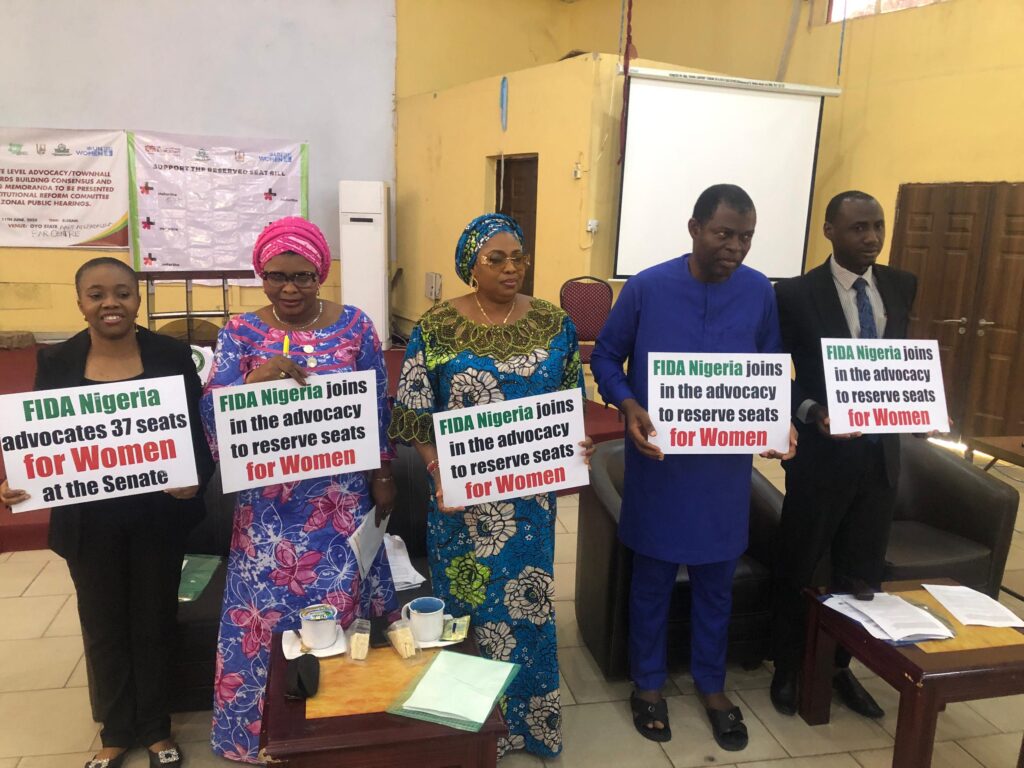Concerned about the persistent underrepresentation of women in Nigerian politics, stakeholders from the political, legal, traditional, and civil society sectors converged in Ibadan, the Oyo State capital, for a high-level advocacy and town hall meeting aimed at promoting the Reserved Seats Bill and advancing women’s political inclusion.
The event, held at the Afe Babalola Bar Centre, Iyaganku, is part of a national project titled “Advancing Women’s Inclusion and Representation in Leadership and Political Processes in Nigeria.”
It was organized by the International Federation of Women Lawyers (FIDA Nigeria) in collaboration with UN Women, and funded by the UK Foreign, Commonwealth and Development Office (FCDO), with support from the Federation of Muslim Women’s Associations in Nigeria (FOMWAN) and the Women’s Political Participation Technical Working Group.
Speaking on behalf of FIDA Nigeria Country Vice/National President, Mrs. Eliana Martins, the Oyo State Branch Chairperson, Barr. (Mrs.) Ademubowale Mercy Adelabu, underscored the strategic relevance of the bill.
“This activity is being implemented across nine focal states, including Oyo, and is aimed at building consensus and consolidating memoranda for presentation to the Constitutional Reform Committee during zonal public hearings,” she said.
Describing the Reserved Seats Bill as a transformative legislative proposal, Martins noted that it is designed to create additional legislative seats exclusively for women at both the National Assembly and State Houses of Assembly levels. The bill passed its second reading in the House of Representatives in July 2024.
“Nigeria ranks 178 out of 182 countries in female parliamentary representation. We are not asking for charity, but for equity,” Martins stated. “This temporary yet strategic measure will fast-track inclusive governance and ensure women are no longer sidelined in leadership.”
She called on lawmakers and the wider society to act decisively: “Let us not miss this opportunity to correct decades of exclusion. Let us build a political culture where women do not have to ask for permission to lead. The time is now.”
In his presentation, Mr. Abu Ayuba, Project Team Lead for FIDA Nigeria, lamented the declining political space for women.
“Nigeria’s democratic experience has failed to expand opportunities for women’s participation. In fact, there has been a reduction in elective positions for women, despite them making up nearly 50% of the population,” he said.
He described the National Assembly’s rejection of five gender bills on March 1, 2022, as a major setback: “That vote reflected the systemic barriers women face in accessing political power.”
Ayuba also highlighted political violence as a critical barrier to women’s participation in elections.
“We cannot speak of inclusion without addressing political violence, which is often weaponized to intimidate and silence women,” he said.
He urged political parties to adopt internal reforms and commit to a minimum of 35% candidacy slots for women, warning that “the Reserved Seats Bill alone will not suffice. Parties must deliberately field and support female candidates.”
Among the dignitaries in attendance were Hon. (Mrs.) Olufunke Comforter Olajide, Chairperson of the Oyo State House Committee on Women Affairs and Community Development; Hon. (Mrs.) Bisi Oluranti Michael, representing Ogbomoso North; Baale of Ekotedo, Dr. Taiwo Ayorinde; Mr. Ibrahim Lawal, Chairman of the Nigerian Bar Association (NBA), Ibadan Branch; Mr. Musibau Adetunbi (SAN); and Mrs. Airat Omowunmi, Vice President of FOMWAN.















